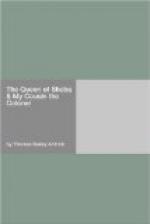In no minute of the twenty-four hours since Lynde left Rivermouth had he felt the want of other companionship. Mary, with her peculiarities, the roadside sights and sounds, the chubby children with shining morning face, on the way to school, the woodland solitudes, the farmers at work in the fields, the blue jays and the robins in the orchards, the blonde and brown girls at the cottage doors, his own buoyant, unreproachful thoughts—what need had he of company? If anything could have added to his enjoyment it would have been the possibility of being waylaid by bandits, or set upon in some desolate pass by wild animals. But, alas, the nearest approximation to a bandit that fell in his way was some shabby, spiritless tramp who passed by on the further side without lifting an eyelid; and as for savage animals, he saw nothing more savage than a monkish chipmunk here and there, who disappeared into his stonewall convent the instant he laid eyes on Lynde.
Riding along those lonely New England roads, he was more secure than if he had been lounging in the thronged avenues of a great city. Certainly he had dropped on an age and into a region sterile of adventure. He felt this, but not so sensitively as to let it detract from the serene pleasure he found in it all. From the happy glow of his mind every outward object took a rosy light; even a rustic funeral, which he came upon at a cross-road that fore-noon, softened itself into something not unpicturesque.
For three days after quitting K—–Lynde pushed steadily forward. The first two nights he secured lodgings at a farm-house; on the third night he was regarded as a suspicious character, and obtained reluctant permission to stow himself in a hay-loft, where he was so happy at roughing it and being uncomfortable that he could scarcely close an eye. The amateur outcast lay dreamily watching the silver spears of moonlight thrust through the roof of the barn, and extracting such satisfaction from his cheerless surroundings as would have astonished a professional tramp. “Poverty and hardship are merely ideas after all,” said Lynde to himself softly, as he drifted off in a doze. Ah, Master Lynde, playing at poverty and hardship is one thing; but if the reality is merely an idea, it is one of the very worst ideas in the world.
The young man awoke before sunrise the next morning, and started onward without attempting to negotiate for breakfast with his surly host. He had faith that some sunburnt young woman, with bowl of brown-bread and milk, would turn up farther on; if she did not, and no tavern presented itself, there were the sausage and the flask of eau-de-vie still untouched in the holsters.
The mountain air had not wholly agreed with Mary, who at this stage of the journey inaugurated a series of abnormal coughs, each one of which went near to flinging Lynde out of the saddle.
“Mary,” he said, after a particularly narrow escape, “there are few fine accomplishments you haven’t got except a spavin. Perhaps you’ve got that, concealed somewhere about your person.”




